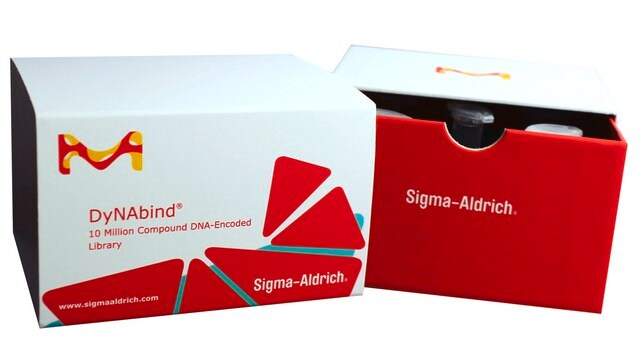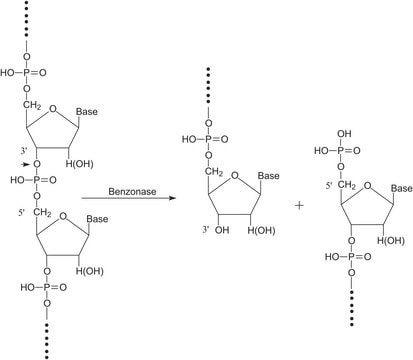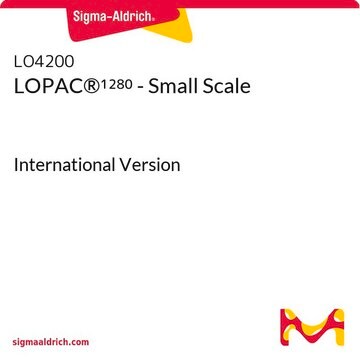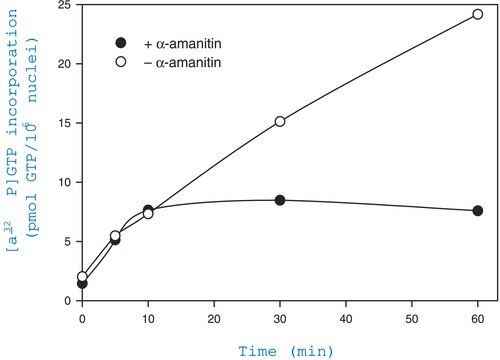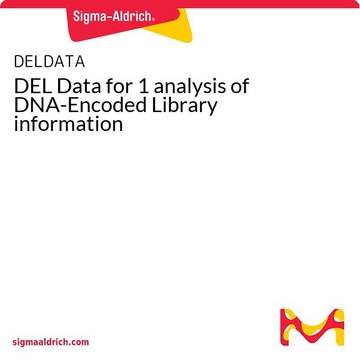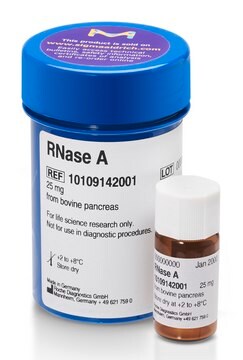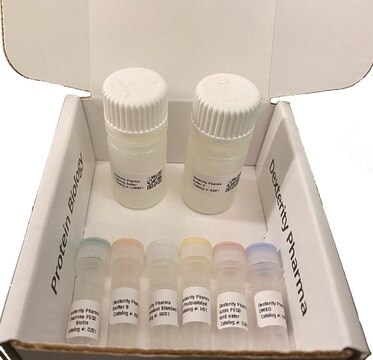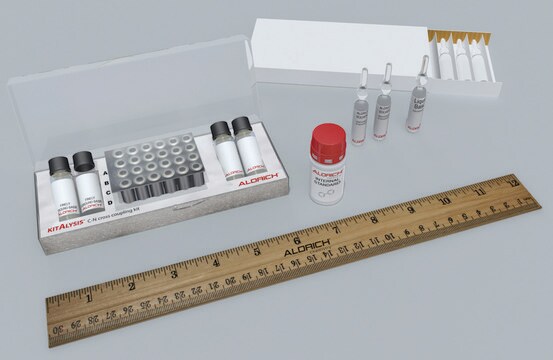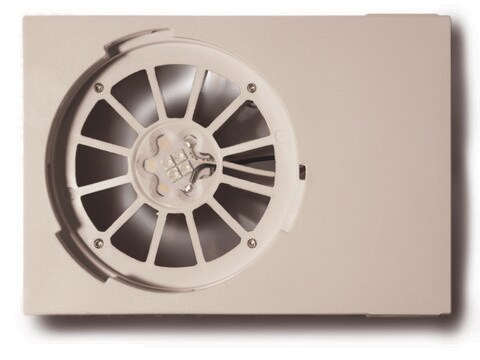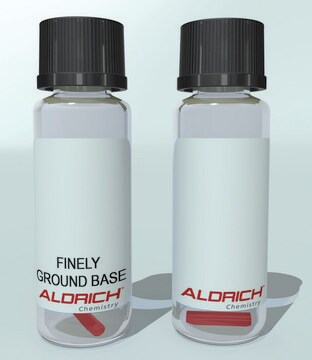DYNA001
DyNAbind® DNA-Encoded Fragment Library
Synonym(e):
DNA encoded library, DNA library
Anmeldenzur Ansicht organisationsspezifischer und vertraglich vereinbarter Preise
Alle Fotos(1)
About This Item
UNSPSC-Code:
41105521
NACRES:
NA.22
Empfohlene Produkte
Form
pellets
Lagertemp.
−20°C
Anwendung
DNA-encoded library (DEL) technology is a drug discovery tool containing small DNA-barcoded compounds (Satz 2018). The DyNAbind fragment DEL contains small molecular weight compounds. The high ligand efficiency of fragment molecules is harnessed to effectively probe a target′s binding site and increase the likelihood of discovering binders (Murray and Rees 2009, Murray et al. 2012). Moreover, this library uses DyNAbind′s proprietary Dynamic Library technology to drive binder optimization and reveal not only individual fragments, but also joined fragment pairs for over 370,000 highly diverse structures (Reddavide et al. 2015, Reddavide et al. 2019). DyNAbind′s proprietary Dynamic Library technology reshuffles fragment pairs to automatically optimize the affinity of binders and increase the chances of finding good hits. After a pooled screening approach, bound fragments can be determined using next-generation sequencing of the barcodes. Analysis of the sequencing data is provided at no additional cost through a portal on our website which will generate a list of the fragments that bind the target. These fragments can be used as structural starting points to develop larger, more drug-like compounds.
Analysis Portal
More information about DyNAbind
Analysis Portal
More information about DyNAbind
Leistungsmerkmale und Vorteile
Product Features and Benefits:
Product Overview:
- Off-the-shelf, affordable access to DEL technology
- Dynamic fragment library provides a revolutionary approach to DELs offering unprecedented library and data quality
- High level quality control with every single member individually purified and validated to maximize data reliability and chances for finding good hits
- Rule of Three used in library design ensures compounds are in favorable fragment space with good ligand efficiency and plenty of room for optimization (Congreve et al. 2003, Jhoti et al. 2013)
- Ability to perform and validate initial DEL screening internally before engaging service provider
- A library with maximized diversity, ready to deploy against nearly any druggable target
Product Overview:
- Dynamic fragment-based DEL as alternative or complement to existing screening technologies
- Consumable, off-the-shelf product for immediate use
- 5 vials, each containing a single-use library for one experimental condition
- Detailed protocol accessible to most drug discovery labs
- A dedicated analysis portal and protocol to identify hits
Rechtliche Hinweise
Product of DyNAbind GmbH
The use of this DyNAbind Product (the “Product”) is covered by European Patents EP 3 094 745 B1 and EP 3 169 832 B1 and corresponding applications pending in the US, Canada, and Japan. Purchaser is granted the right to use the Product for its internal research use only. This limited use label license does not grant the purchaser any right to use resulting fragments or products in commercial products or services. For information on commercial rights, please contact the outlicensing department at licensing@dynabind.com.
The use of this DyNAbind Product (the “Product”) is covered by European Patents EP 3 094 745 B1 and EP 3 169 832 B1 and corresponding applications pending in the US, Canada, and Japan. Purchaser is granted the right to use the Product for its internal research use only. This limited use label license does not grant the purchaser any right to use resulting fragments or products in commercial products or services. For information on commercial rights, please contact the outlicensing department at licensing@dynabind.com.
DyNAbind is a registered trademark of DyNAbind GmbH
Lagerklassenschlüssel
13 - Non Combustible Solids
WGK
WGK 3
Flammpunkt (°F)
Not applicable
Flammpunkt (°C)
Not applicable
Hier finden Sie alle aktuellen Versionen:
Analysenzertifikate (COA)
Lot/Batch Number
Die passende Version wird nicht angezeigt?
Wenn Sie eine bestimmte Version benötigen, können Sie anhand der Lot- oder Chargennummer nach einem spezifischen Zertifikat suchen.
Besitzen Sie dieses Produkt bereits?
In der Dokumentenbibliothek finden Sie die Dokumentation zu den Produkten, die Sie kürzlich erworben haben.
Kunden haben sich ebenfalls angesehen
The 'rule of three' for fragment-based drug discovery: where are we now?
Harren Jhoti et al.
Nature reviews. Drug discovery, 12(8), 644-645 (2013-07-13)
Christopher W Murray et al.
Trends in pharmacological sciences, 33(5), 224-232 (2012-03-31)
Fragment-based drug discovery (FBDD) has become established in both industry and academia as an alternative approach to high-throughput screening for the generation of chemical leads for drug targets. In FBDD, specialised detection methods are used to identify small chemical compounds
Francesco V Reddavide et al.
Angewandte Chemie (International ed. in English), 54(27), 7924-7928 (2015-05-28)
Dynamic combinatorial chemistry (DCC) explores the thermodynamic equilibrium of reversible reactions. Its application in the discovery of protein binders is largely limited by difficulties in the analysis of complex reaction mixtures. DNA-encoded chemical library (DECL) technology allows the selection of
Alexander L Satz
ACS medicinal chemistry letters, 9(5), 408-410 (2018-05-26)
Use of DNA-encoded libraries (DELs) in the pharmaceutical industry has rapidly increased. We discuss what to expect when you run a DEL screen and contemplate guidelines for library design. Additionally, we consider some visionary work and extrapolate to the future.
A 'rule of three' for fragment-based lead discovery?
Miles Congreve et al.
Drug discovery today, 8(19), 876-877 (2003-10-14)
Artikel
Fragment-Based DNA-Encoded Library for Drug Discovery
Unser Team von Wissenschaftlern verfügt über Erfahrung in allen Forschungsbereichen einschließlich Life Science, Materialwissenschaften, chemischer Synthese, Chromatographie, Analytik und vielen mehr..
Setzen Sie sich mit dem technischen Dienst in Verbindung.